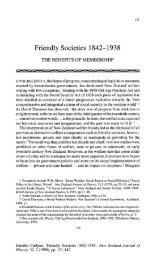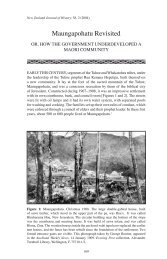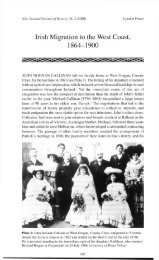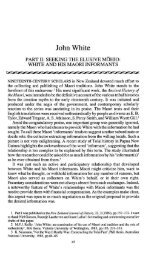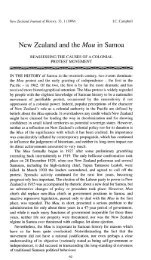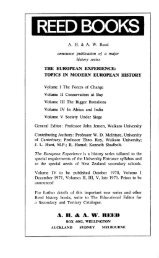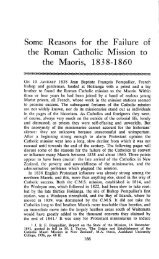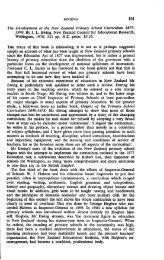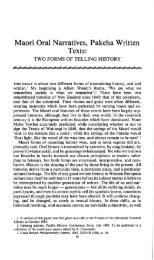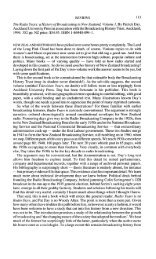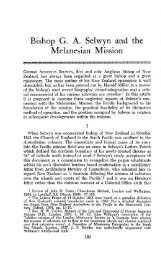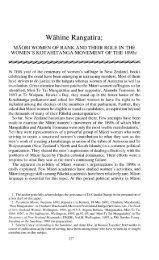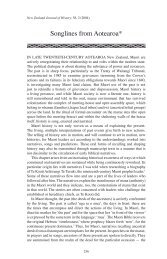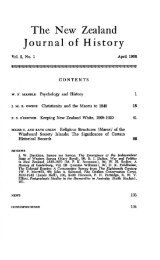Sulu and Sabah. By Nicholas Tarling. Oxford University Press, Kuala ...
Sulu and Sabah. By Nicholas Tarling. Oxford University Press, Kuala ...
Sulu and Sabah. By Nicholas Tarling. Oxford University Press, Kuala ...
You also want an ePaper? Increase the reach of your titles
YUMPU automatically turns print PDFs into web optimized ePapers that Google loves.
196 REVIEWS<br />
lacking in context.<br />
Part of the difficulty seems to be <strong>Tarling</strong>'s desire to avoid needless repetition of<br />
observations already presented in his earlier work, Britain, the Brookes <strong>and</strong><br />
Brunei, but as events in Brunei, Sarawak, <strong>Sabah</strong> <strong>and</strong> <strong>Sulu</strong> were intricately intertwined,<br />
<strong>and</strong> tended frequently to be considered as a whole by both local <strong>and</strong> London<br />
authorities, the problems of dividing the material are formidable. The present<br />
book is advertised as a companion volume to the former. It appears rather,<br />
despite a slightly different thrust, to be an extension of it, <strong>and</strong> regarding the<br />
period prior to the formation of the North Borneo Company, the reader is inclined<br />
to wish that the two books could have been published as a single multi-volume<br />
work, so interdependent <strong>and</strong> complementary are they.<br />
Similarly, in spite of its prominence in the title, <strong>Sulu</strong>'s role in the book is circumscribed.<br />
Within the frame of British policy toward North Borneo, the <strong>Sulu</strong><br />
Sultan functioned principally as the legal peg on which every cession of the area<br />
from 1761 had hung. Britain was therefore constrained to support his independence<br />
or at least the fiction of his independence vis-a-vis the Spanish for as<br />
long as possible. This was to the Sultan's advantage, but a successful British drive<br />
to engross the internal trade of North Borneo, long <strong>Sulu</strong>'s most valuable<br />
economic hinterl<strong>and</strong>, was not. According to at least one scholar, <strong>Sulu</strong>'s hold on<br />
the commerce of the region was not broken by the North Borneo Company until<br />
as late as the 1890s. 1 Tenure of North Borneo was of overriding concern to both<br />
Britain <strong>and</strong> <strong>Sulu</strong>, but because of their differing perspectives, the legal status of<br />
the matter, which so exercised the British, did not automatically reflect the real<br />
boundaries of the Sultan's freedom of action. What the reader misses in the narrative<br />
of British-Spanish-<strong>Sulu</strong> dealings, is an occasional alternative st<strong>and</strong>ard by<br />
which to judge it, when <strong>and</strong> how much the British view of <strong>Sulu</strong>, coloured as it was<br />
by diplomatic necessity, diverged from actual local circumstance.<br />
Strictly speaking, however, such questions lie outside the defined purpose of<br />
this book. In all that touches British concerns, what emerges is a skillful, often<br />
fascinating portrait of the multiple moves — from conflict to sometimes ungainly<br />
compromise, as each new challenge to her interest arose — by which Britain's imperial<br />
expansion in North Borneo gradually took form.<br />
Cornell <strong>University</strong><br />
LINDSEY REBER<br />
Pacific Isl<strong>and</strong>ers under German Rule: A Study in the Meaning of Colonial<br />
Resistance. <strong>By</strong> Peter J. Hempenstall. Australian National <strong>University</strong> <strong>Press</strong>,,<br />
Canberra, 1978. 264pp., illustrations, maps, end papers. Aust. price: $19.50.<br />
GERMANY lost her Pacific colonies in 1914. Yet until very recently only scant information<br />
on German rule has been available. At best it has been fragmentary,<br />
<strong>and</strong> it is still far from complete. It may be that this is due to the fact that it is the<br />
winners who write history. If so it should also be said that such neglect has been<br />
1 James F. Warren, Trade, Raid, Slave: The Socio-Economic Patterns of the <strong>Sulu</strong><br />
Zone, Ph.D. thesis, Australian National <strong>University</strong>, 1975.



